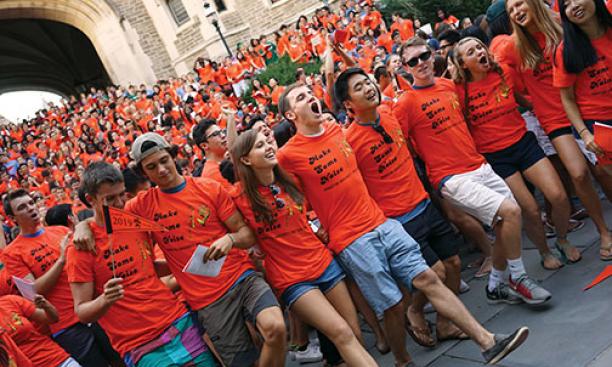

Looking out at the Class of 2019 seated for Opening Exercises in the University Chapel Sept. 13, President Eisgruber ’83 recalled his own arrival on campus knowing the names of only two classmates: his roommates.
In contrast, he said, he imagined that the 1,319 freshmen had had extensive contacts via social media in preceding months. But while they may have felt that they already knew each other, he said, they were just beginning “the process of living together and forming human relationships that matter, and of contending with ... diversity, at once wonderful and difficult.”

Eisgruber did not minimize the challenge of reconciling different perspectives. “It will sometimes be hard,” he conceded, noting that the happy images of diversity depicted in University brochures won’t always be easily re-created.
While he said that students must make their own choices about when to sympathize, when to confront, when to accommodate, and when to walk away, he offered this advice: “Strive to understand and learn from the perspectives and experiences of others around you ... even when you find yourself unable to accept or endorse their opinions.”

Eisgruber’s address continued a discussion from the previous night centered on this year’s “Princeton Pre-read,” Whistling Vivaldi: How Stereotypes Affect Us and What We Can Do by Claude Steele, a social psychologist who is executive vice chancellor and provost of UC-Berkeley. The book was distributed to incoming freshmen and to faculty and administrative staff to provoke discussion on campus.
The book deals with stereotype threat, which Steele — who spoke at the Saturday night Freshman Assembly at McCarter Theatre — described as a situation in which someone feels pressured because of the risk of confirming a negative stereotype and may underperform as a result. “The threat is organic and is rooted in our history,” he said, but it can be overcome through trust and proactive countersignals.
Also speaking at the assembly were English professor Esther Schor and sociology professor Miguel Centeno, who drew on their personal experiences for lessons from Steele’s book.
Schor discussed how she faced stereotype threat as a young woman at Yale and, as a professor, the stigma of “getting old.” Centeno described how he felt like an “impostor” as a Hispanic academic and how at times he still questions his achievements.
“We lose so much when we can’t recognize ourselves as part of the same community,” Centeno said. “Give each other the benefit of the doubt — you’ve got four years in paradise.”
Whistling Vivaldi also is being applied more broadly across campus: It was taught in a Freshman Scholars Institute course over the summer, and professors and graduate students attended events on how to apply Steele’s research and related concepts to their teaching, according to Lisa Herschbach, associate dean of the college.
Following the assembly, freshmen broke into precepts for more conversation. “The book definitely resonated with me,” said Jessica Goehring ’19 before heading to one of the residential-college precepts. She said that in high school she often participated in math competitions where girls were in the minority, and she sometimes “felt awkward trying to take control of a situation or trying to contribute.”
Evan Wildenhain ’19 said the book “made me better equipped to be empathetic” to those who face stereotype threats, while Jessica Wright ’19 said she hopes to find political or economic tools “to bring these issues to light and to potentially solve them.”
